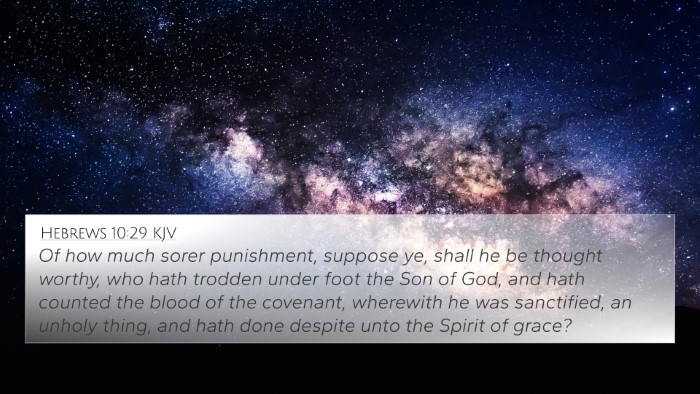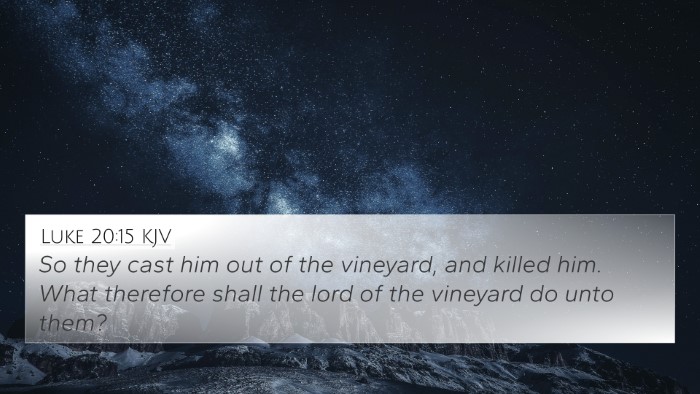Understanding Matthew 21:40
Matthew 21:40 states: "When the lord therefore of the vineyard cometh, what will he do unto those husbandmen?"
This verse occurs during the parable of the wicked husbandmen, which is found in various Gospels. Here, Jesus, speaking to the religious leaders, poses a rhetorical question that invites them to reflect on the consequences of the actions committed by the wicked tenants of the vineyard, portraying a deep lesson regarding accountability and divine judgment.
Commentary Insights
Matthew Henry's Commentary
Context: Matthew Henry emphasizes that this parable serves as a direct critique of the Jewish religious leaders' failure to acknowledge God's messengers.
Interpretation: The question posed signifies the inevitable judgment that awaits those who reject God's authority. Henry suggests this reflects God's patience and eventual justice, warning against complacency in spiritual stewardship.
Albert Barnes' Notes
Analysis: Barnes highlights the significance of the vineyard, symbolizing Israel, and the husbandmen representing the religious authorities. He notes that the inquiry drives home the point of facing retribution for their malicious actions against the prophets of the Lord.
Conclusion: The lord of the vineyard's eventual coming is seen as an allegory for Christ’s return, indicating that those who have mistreated His servants will face consequences.
Adam Clarke's Commentary
Exegesis: Clarke notes that this verse carries a weighty implication about divine governance and how the stewardship of the Gospel must be treated with utmost respect. The question indicates the contemplation of justice and retribution in the grand narrative of Scripture.
Reflection: Clarke posits that the rhetorical nature of the question invites self-examination among the listeners, calling them to recognize their guilt in failing to honor God’s representatives.
Bible Verse Connections
Matthew 21:40 connects to several other scriptures that deepen our understanding of its message:
- Isaiah 5:1-7: The song of the vineyard outlines God’s care for Israel and their subsequent failure, providing a foundational backdrop for Jesus’ parable.
- Luke 20:15-16: Here, Jesus elaborates on the fate of the wicked tenants, showcasing similar themes of judgment and repercussion.
- Mark 12:9: Mark shares the parable with the same context emphasizing consequences for the rejection of the vineyard owner’s son.
- Matthew 22:7: This verse reiterates the imminent destruction and judgment for those who reject the king's invitation, abundantly paralleling the themes in Matthew 21:40.
- Romans 14:10: This emphasizes accountability before God, reflecting the essence of the judgment theme seen in Matthew 21:40.
- Luke 19:27: It discusses the enemies of Christ, paralleling the tenants’ ill treatment of the master’s representatives.
- Revelation 20:11-15: This depicts the final judgment, resonating with the accountability emphasized in Matthew 21:40.
Applying the Meaning of Matthew 21:40
As we reflect on the implications of Matthew 21:40, it is essential to consider the responsibilities we hold as stewards of God’s Word and message. It is crucial to engage in:
- In-depth Study: Utilizing resources such as Bible concordances and cross-reference guides can help uncover the wealth of connections in Scripture.
- Self-Examination: Like the religious leaders of Jesus' time, we should assess our attitudes toward God’s servants and His messages.
- Community Discussion: Encourage dialogues within your community to explore the themes presented in this verse and others it relates to.
Thematic Bible Verse Connections
This verse highlights broader themes within Scripture, which deserves careful exploration:
- Judgment: Recognizing that rejection of God’s call leads to consequences, as echoed throughout the prophetic and apostolic teachings in both Old and New Testaments.
- Accountability: The call to be good stewards of God’s gifts and callings that we receive and how we treat God’s truth.
- Faithfulness: This verse encourages examining our faithfulness in fulfilling the purpose God has set before us.
Conclusion
Matthew 21:40 serves as a profound reminder of the relationship between accountability, divine justice, and the stewardship of God’s message. By engaging in comprehensive Bible cross-referencing and studying other related scriptures, believers can form deeper understanding and connections that enrich their faith journey.
In sum, this exploration has established the inter-Biblical dialogue surrounding Matthew 21:40 through critical insights provided by recognized commentaries, allowing for an enriched grasp of the theological implications woven throughout Scripture.





